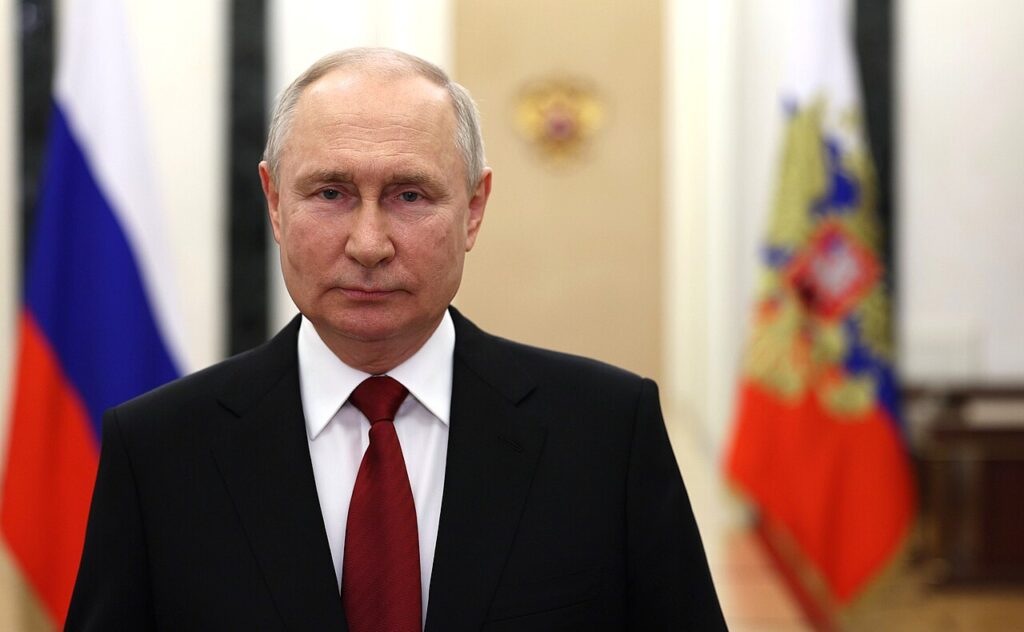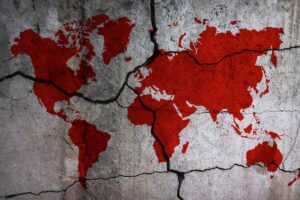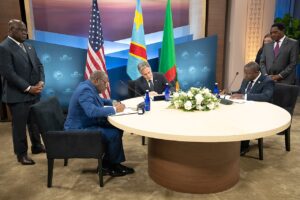The Red cell project
The Red Cell was a small unit created by the CIA after 9/11 to ensure the analytic failure of missing the attacks would never be repeated. It produced short briefs intended to spur out-of-the-box thinking on flawed assumptions and misperceptions about the world, encouraging alternative policy thinking. At another pivotal time of increasing uncertainty, this project is intended as an open-source version, using a similar format to question outmoded mental maps and “strategic empathy” to discern the motives and constraints of other global actors, enhancing the possibility of more effective strategies.
Putin’s Cling to Power Until Death or Defeat
Russian President Vladimir Putin’s term comes to an end in March 2024, and most analysts believe he will run again. Putin can remain in office until 2036. The 2020 changes to the Russian Constitution allow him to serve two additional six-year terms, making it possible for Putin to be in office until 2036 when he will be 83 years old. Levada, an independent polling firm, shows in its post-Wagner-uprising poll (late July 2023) that the Russian public’s support for the invasion of Ukraine increased from 40% in June to 45% a month later despite mounting casualties. The proportion of Russians approving Putin’s overall job performance reached 82% in July.
There has been an endless stream of speculation about Putin’s health based on his increasing weight and his apparent phobia in contracting COVID. The image of French President Emmanuel Macron and Putin sitting approximately six meters away from one another this past February was eye-catching for many.1Macron had refused Moscow’s request to get a COVID test But three days later, Putin sat at a tiny table close to Kazakh President Qasym-Zhomart Toqaev, a traditional ally. Western analysts have no hard evidence that Putin has a life-threatening disease, such as cancer, or even a debilitating one like Parkinson’s or dementia.
Irrespective of Putin’s possible health issues, Russian mercenary leader Yevgeny Prigozhin’s brief mutiny raised further questions about Putin’s ability to continue to lead. CIA Director William Burns commented that “recent uprising by a mercenary group in Russia exposed “signs of weakness.’” He noted that Russian decision-makers, including Putin, appeared “to be adrift for those 36 hours.” Nevertheless, except for the defection of a former commander in the Ukraine war, Gen. Sergei Surovikin, Russia’s armed forces, and intelligence services — which have formed the bedrock of the Putin regime — stood by him and did not join or support the Wagner uprising.
Alexander Gabuev, director of the Carnegie Russia Eurasia Center in Berlin, contends that “in taking down Wagner [and now following Wagner’s death], Putin . . . removed one of the most potent threats to his rule: an amalgam of battle-hardened professional soldiers and poorly trained criminals who were not fully integrated into the official power structure.” Despite the embarrassment, Putin has come out stronger: no other figure or movement on the horizon has the potential to shake his regime.
In the near term, the continuing conflict will make Putin more inclined to cling to power. Like the tsars who prided themselves on increasing Russia’s territory, recapturing Ukraine (or at least parts of it) and undermining its chances to become a NATO member by dragging out the war would solidify Putin’s legacy. His tenacity might be fueled by his distrust of others: He might even fear that some in his coterie would compromise in pursuing the war. Putin’s return to power in 2012 was partly triggered by what he saw as former Russian President Dmitry Medvedev’s weak response to Western success in taking down former Libyan dictator Muammar Qadhafi and setting another precedent for Western intervention.
A Resounding Military Defeat Could Oust Putin
The loss of Crimea, on the other hand, would be an indisputable sign of defeat for Putin and the Russian people. According to British historian Orlando Figes, for “more than 20 years, ever since the collapse of the Soviet Union, [Crimea’s] rule by Kiev has been a major source of Russian resentment – inside and outside the peninsula — and a major thorn in Ukraine’s relations with Russia.” Russians saw Crimea as an integral part of their country, having wrongfully been given to Ukraine by former Soviet leader Nikita Khrushchev. Putin would go to all lengths to save Crimea, including the possible use of tactical nuclear weapons, in which case NATO would most likely launch a conventional arms attack on Russia. In the event of a full-scale NATO attack, the leadership surrounding Putin might have no other choice but to remove him to avoid an escalating conflict with NATO, especially if Russia’s close ally, China, is also urging Putin’s exit.
The new leadership would be under pressure from the United States and other NATO countries to end the conflict and repudiate all claims to Ukraine, perhaps in return for some weakening of the sanctions. The Allies would also probably insist on further measures, such as conventional and nuclear reductions, reparations, and prosecution of war criminals, including Putin himself. In essence, China could turn into the arbitrator, wanting to restore peace but not to see its close ally so humiliated that it reflects badly on China’s standing.
A Chatham House “briefing paper” that envisages a post-Putin Russia after a complete defeat (including Crimea and Donbas but absent the use of nuclear weapons) assesses that…
“The core features of Russia’s state system would [still] be recognizable on the basis of what we see today . . . Russia’s political system would remain essentially authoritarian. The guiding principles would be top down stability and order, although the potential for elite divisions would be real. Political evolution would occur in the space between a limited easing of controls and an even more repressive model.”
Indeed, many Russian elites and members of the public share Putin’s view that Russia was mistreated after the end of the Cold War. A post-Putin leadership might feel incapable of refusing all Western demands in the case of a resounding Russian defeat, but they would fend off radical changes, such as major constitutional revisions or a breakup of Russia into smaller states, as some Western-based critics have espoused. They would most likely refuse to hand Putin over to the International Criminal Court or pay reparations, which could spark a public outcry.
A Long, Drawn-Out Conflict Could Oust Putin
A war that drags out, causing more and more casualties and requiring additional “mobilizations,” could force Putin’s ouster, too. The public’s breaking point remains unclear, but more intra-elite dissension, mass protests, and greater difficulty in filling draft quotas due to desertions and mass emigration would probably foreshadow a move on Putin by members of his entourage, who would want to save themselves. Putin would no doubt be promised that he and his family would not be hurt, or his wealth compromised if he made a graceful exit.
Kathryn Stoner, a Stanford political scientist, sees the possibility of a “group of elites . . . closest to him…rul[ing] as a junta.” Such a junta would include hardliners like Nikolai Patrushev, the head of the Security Council; Sergei Naryshkin, the head of Russian foreign intelligence; and Aleksandr Bortnikov, the head of the Federal Security Service — all of whom would most likely try to preserve the core of Putin’s policies. Growing Russian losses would force even a hardline Putin-like junta to end the conflict, preserving as much as possible of any Russian gains, particularly Crimea. Even with a growing opposition to the war, a strong right-wing nationalist public would remain, and any Putin-like successor(s) would be unlikely to want to alienate this group. However, there could be a little more margin for achieving a peace settlement: China’s President Xi Jinping might not feel as bound to back a post-Putin Russia and could see clear economic and political advantages for Beijing in trying to maneuver Moscow into a peace accord.
The Longer-Term Prospects
A study by political scientist Barbara Geddes has found that since World War II less than 25% of autocratic breakdowns have led to democratic transitions, with 75% leading to the perpetuation of the autocracy under a new leader (think Nicolás Maduro in Venezuela after the death of Hugo Chávez in 2013), or the replacement of one form of autocracy with another (Iran after the fall of the Shah in 1979 and the rise of the Islamic Republic).
In Russia’s case, the country has little experience with liberal democracy, only for the decade or two after the end of the Cold War, a period that is widely seen by Russians as an economic calamity for the middle and working classes. Nevertheless, Russia has known periods of reform, many of which failed at home or abroad and did not necessarily endure. Over time, a more technocratic leader could emerge who would focus more on repairing the unsustainable economy. The International Energy Agency (IEA) predicts that because Russia cut its ties to what had been its biggest consumer (Europe), the country’s gas exports will be around 130 billion cubic meters by 2030, one-third of the level expected before 24 February 2022. The prospects for Russia’s oil production are not bright over the longer term because the country has lost access to Western technology and investment. A technocratic reformer could still be authoritarian but would most likely have to moderate Putin’s highly repressive policies to lure back needed expertise and rebuild a technically savvy elite.
Any warming of Russian-Western ties could take a long time due to the lingering effects of sanctions and greater opportunities for Russia in the Global South. Max Bergmann, an analyst with the Center for Strategic and International Studies — a Washington, DC, think tank — and former National Security Council and State Department official, believes that any reconciliation would also require a more welcoming attitude on the part of the United States and Europe: “Significantly, the Soviet Union collapsed not when Reagan or the West had an iron fist but when they had an outstretched arm.” Regardless, an increasing Russian dependence on China is a certainty under all scenarios.
Pre-Planning Necessary to Exploit Opportunities
State failure and a breakup of Russia are unlikely, but a weakened post-Putin government after years of economic deprivation would make Russia more dependent on China and increase the potential for instability in different regions, as occurred with Chechnya in the years after the end of the Cold War. A weakened Russia might not be any less dangerous than the present one and could provide the platform for another authoritarian regime like Putin’s.
More difficult would be a Western effort to rebuild ties and encourage a post-Putin Russia that looks West as well as East. Although, as has been shown above, Putin’s successors will not be inclined to trust the West, a future leader seeking economic regeneration for Russia might want to improve Western ties. However, the West has a bad record of detecting improvement in Russia, because the view that Moscow is always a threat is so ingrained among U.S. policymakers. In cases where there will not be much warning, scenarios are helpful for beginning the planning process early so any opportunities that arise suddenly will not be missed. After Joseph Stalin’s death in 1953, there was a confused reaction with British Prime Minister Winston Churchill keen to engage the new Malenkov government, while former U.S. President Dwight Eisenhower was worried about offending right-wing opinion at home. Similarly, many scholars believe that the George H. W. Bush administration, when it came into office in January 1989, was slow to work with Soviet leader Mikhail Gorbachev despite the rapport previously established by President Ronald Reagan. Rebuilding a peaceful relationship with Russia will not be easy, but without doing so, the global community will be less able to meet the critical challenges ahead.
The Red Cell thanks the Swedish Defence University for its support in the research and writing of this article.
Notes
- 1Macron had refused Moscow’s request to get a COVID test




